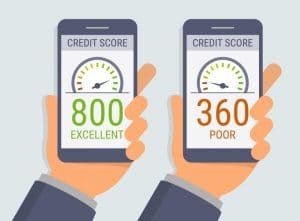What do lenders mean by a good credit score?
What Is A Credit Score?
When you start researching home loan information, you’ll read a lot about unfamiliar terms such as loan-to-value ratios, unconditional contracts and credit scores. You may have also discovered that your credit score will have an impact on your capacity to borrow for your home loan. If you haven’t yet taken out any kind of loan from a bank or similar lender/financial institution then it’s possible you don’t know what a credit score is, so let’s tackle that first. Exactly what is a credit score?
Put simply it is a three-digit number that represents your financial history with credit.
The digit usually ranges from 300 to around 850/900, but it’s possible to get higher than this (up to 1200). It’s also important to understand that different credit reporting agencies will have their own method of calculating a credit score. The figure from one agency won’t necessarily be the same as the figure calculated by another agency.
Your credit score will be based on things like how well you pay your bills – so if you’re frequently late on bills such as telephone or utilities this will potentially drag down your credit score. It’s also determined by how much debt you have, how well you manage your credit cards, and how many times you’ve applied for credit.
In this article we’ll explain all about what a good credit score is and show you how to do a quick credit score check so you can maximise your chances for a favourable outcome when applying for a home loan.
Credit Reporting Agencies
Many people underestimate the role of finance and the importance of your credit score when it comes to fulfilling your property dreams.
Currently in Australia there are three reporting agencies who provide credit scores – Equifax (formerly Veda), Experian and illion (formerly Dun & Bradstreet). Equifax is by far the biggest, and we’ll focus most on Equifax here, because that is the one the big four banks use most. But just remember there are others.

How To Check Your Credit Score
When you first apply for a home or property investment loan, there are a large number of financial checks and balances that will be assessed by the lender of your choice.
The components of a successful loan application can be complex and having a qualified and professional mortgage broker help you navigate the process is an excellent approach to boosting your chances of success.
That said, you are entering into a serious, binding, legal agreement with the lender, so you should take time to understand the important elements involved. One of the most significant fundamentals to understand is the Equifax Score which most Australian lenders use as a credit rating.
The Equifax Score helps lenders assess your credit application when you apply for a loan or line of credit. Similar to a tool that ranks your risk, all credit information is used to predict the outcome of your loan within the next 12 months.
So, if you’ve never asked for your credit score, there’s no time like the present. Let’s dive in to how you might do a credit score check so you can see what you’re dealing with.

Credit Score Check
Credit reporting agencies MUST give you access to your consumer credit report for free once every three months.
You can also request a copy if you’ve been denied credit within the past three months, or you’ve asked for the information on your credit report to be corrected.
Bear in mind, they may give you your credit report, but some agencies (most notably Equifax) are now charging a subscription fee for you to access your three-digit score.
It’s equally important to recognise that in addition to your credit score from a reporting agency, lenders will apply their own lending criteria, so you shouldn’t rely solely on your credit score or your credit report as an indicator of whether you can apply for the credit or not.
Each agency has very clear instructions on its website about how to do a credit score check, so visit those websites for simple step-by-step instructions for getting your credit score or credit report.
To find out more about these agencies visit this government website: https://www.oaic.gov.au/privacy/credit-reporting/access-your-credit-report/
Of course, it’s one thing to find out what your credit report says, or what your credit score is, but it’s another to understand what makes for a good credit score.
Financial Problems
Your credit score isn’t just about the actual financials you might see on a balance sheet or profit and loss statement. Many people don’t realise the way in which you conduct yourself financially can impact your credit score. For example, if you regularly miss your credit card payments or are always overdue paying your monthly phone bills, then this can have a negative outcome on your credit score.
This is why seeking advice from a mortgage broker can be invaluable. They can provide guidelines you can apply in the lead up to a loan application that will demonstrate good financial practice to the lender, and this will ultimately help you in the loan approval process.
What is considered a good credit score in Australia?
One of the benefits of understanding your credit score is that there are specific guidelines about what constitutes a good score.
Your Equifax Score is a credit rating between 0 and 1200 that lenders look at when you apply for a loan. Put simply, the higher your credit score the better, because your credit score affects your access to better loan and credit card deals.
Read on to understand what is a good credit score.

Credit Cards
Your score is calculated via the information on your credit report at a certain point in time. So, it is not a fixed figure, but rather changes as information is added or removed from your report.
You Equifax Score indicates the likelihood of an “adverse event” being recorded on your credit file in the next 12 months. An adverse event can be a range of “bad credit” listings such as a default, a bankruptcy or a court judgment.
So, with this in mind, the higher your score, the less likely it is that an adverse event will be recorded on your file and the less of a risk you will appear to lenders. The lower your credit score, conversely, the riskier you will appear as a borrower.
What is an Equifax score?
It is crucial to understand what a good credit score is so here’s a summary of what your Equifax Score indicates:
- Below average to average (0-509): It’s more likely an adverse event will be recorded on your file in the next 12 months. You are in the bottom 20 per cent of Equifax’s credit-active population.
- Average (510-621): This score suggests that it’s likely that you will incur an adverse event in the next 12 months. Your score places you in the bottom 21 to 40 per cent of the credit-active population.
- Good (622-725): Adverse events are less likely to be recorded for the next 12 months. You fall in the mid-range (41 to 60 per cent) of Veda’s credit-active population.
- Very good (726-832): Unfavourable events are unlikely to be recorded onto your credit file within the next 12 months. Your score places you in the second-highest percentile range of the credit-active population (61 to 80 per cent).
- Excellent (833-1200): Adverse events are highly unlikely to happen within the next 12 months when compared to the average Australian. The odds of no adverse events occurring on your credit file in the next 12 months are five times better than the population average and you are in the top percentile range (81 to 100 per cent).
What is considered a good credit score in Australia
As outlined previously, when you do your credit score check the higher the score, the better. Most reporting agencies have a similar structure in that the higher the number, the better. Experian scores are a maximum of 1000, with the Good range starting around 625 – 699, before moving to Very Good (700 – 799) and Excellent (800 – 1000). Illion scores are almost identical, ranging up to 1000 with similar bands for Good, Very Good and Excellent.
OK, I understand, but how are credit scores actually calculated?
The thing about credit scores, particularly in the modern era, is that they’re not assessed by a high-level genius with a calculator running their eye over your bank account and credit card statements.
Today’s technology means credit scores are now calculated by an algorithm which draws on information from your credit file. Your credit score is, therefore, generated by looking at patterns in your credit history, characteristics of your credit profile, and aspects of your credit applications.
There are a number of variables that are considered during the calculation of your credit score, and it is important to understand what is a good credit score, along with the factors that impact that credit score, so you can improve it if possible. These factors can include:
- The number of applications you make to different credit providers within a short period when you’re “shopping around” for credit. This will increase the number of credit enquiries on your credit file and is less favourable than having infrequent and fewer credit enquiries.
- The spread of credit enquiries over time can influence your score too. Older credit enquiries have a different level of risk associated with them than more recent credit enquiries. That’s why it’s so important to keep your credit enquiries to an absolute minimum.
- Negative information such as defaults, serious credit infringements, bankruptcies, and court judgements are high risk indicators which can adversely impact your credit score.
- Even your personal details can come into play. This can include your age, length of employment as well as length of time at your current address. Credit assessors generally like to see stability of employment and in your living situation, which both can improve your credit score.
- The age of your credit history can impact your credit score, so a credit file with a longer credit history will have a different level of risk than a newer file with a limited credit history.
When calculating your credit score as a business owner, variables such as the location of your business, the length of time your business has operated at its current address, and the credit history information contained in the commercial section of your report may be considered. For this reason, it can be more difficult for business owners to have credit applications approved.
How Can I Improve My Credit Score?
Because your credit score is an organic measure that can gauge changes in your financial dealings, there are practices which can be implemented to improve your score.
The number one thing is also the simplest – pay your bills on time! No excuses!
We know it can be tricky to keep up with debts, but online banking makes it easy to never miss a bill payment by setting up reminders or scheduled payments. That way you should never miss a payment – even if you’re on holiday at the time!

Also, pay off credit card balances in full in every month.
That said, when it comes to your credit score, the balance of your credit card debt is less important than your credit limit. So, consider lowering your limit from, say, $15,000 to $5,000 to gain some credit score points.
This approach is particularly important if you have more than one credit card, because all of the limits across the cards will be included in the calculation of your credit score.
In fact, axe any credit cards that you don’t use or are there for a “rainy day” because that will likely have a favourable impact on your credit score.
What Is The Minimum Credit Score for a Home Loan in Australia?
If you’ve completed your credit score check and received a sub-optimal result, you may be wondering what is the minimum credit score for a home loan in Australia?
It’s difficult to be specific because there are so many other factors involved in whether a home loan gets approved. It’s crucial to understand that you can take steps to improve your credit score and you should really do this before you put in an application that might not get approved.
How long does it take to improve credit score Australia?
This is also difficult to quantify specifically because it really will depend on how much remediation is required and how rapidly you can adopt excellent behaviours.
Be aware, it takes time to improve your credit score. Likely months, but don’t be discouraged. It’s important to understand that it is possible to remediate your credit score! It’s a matter of understanding the issues and tackling them in a methodical way.
Intuitive Finance – the smart choice
You can now see, there’s more to being approved for a personal loan or a home loan than just filling out some paperwork and blindly hoping for the best.
Your ability to consistently manage credit and repay debt is but one of the ways that can influence how your credit score is calculated.
The world of banking and finance can be a pretty daunting one for both novice and sophisticated investors and since our establishment in 2002 we’ve focused on providing outstanding service and business standards.
This approach was vindicated when we received the Finance Broker Business Award at the 2018 Mortgage and Finance Association of Australia (MFAA) Excellence Awards.
Understanding what constitutes a good credit score as well as the ways that you can improve your score is vitally important in today’s financial world. So why not contact Intuitive Finance today to ensure you have the right information and expert support on your side no matter what stage of the property ownership journey you are on?
The information provided in this article is general in nature and does not constitute personal financial advice. The information has been prepared without taking into account your personal objectives, financial situation or needs. Before acting on any information you should consider the appropriateness of the information with regard to your objectives, financial situation and needs.- Don’t buy property in a trust before reading this - February 3, 2026
- When should you refinance? Navigating RBA rate cuts and loyalty rates - January 23, 2026
- What the latest inflation data means for borrowers with the upcoming February RBA decision - January 20, 2026

